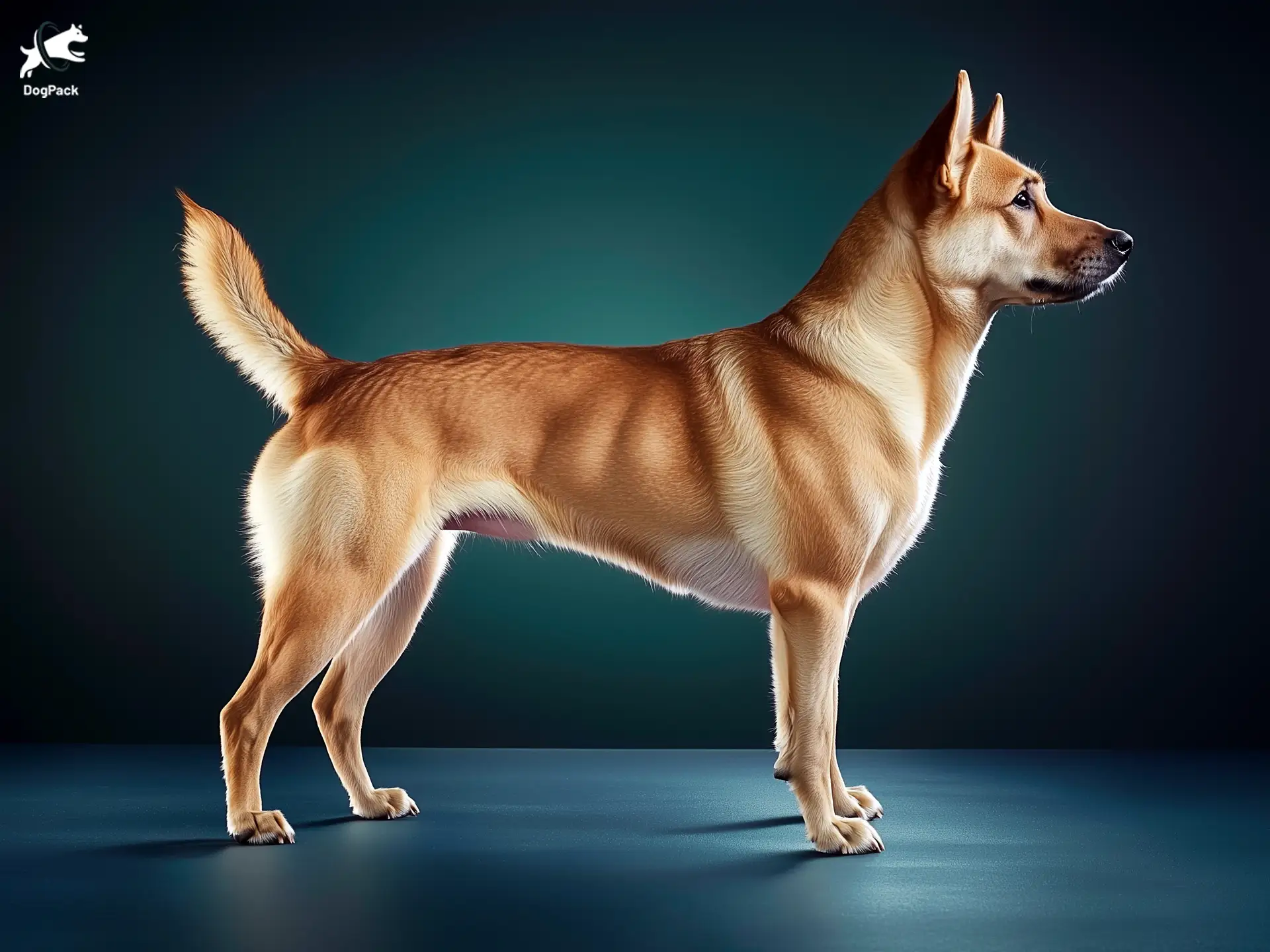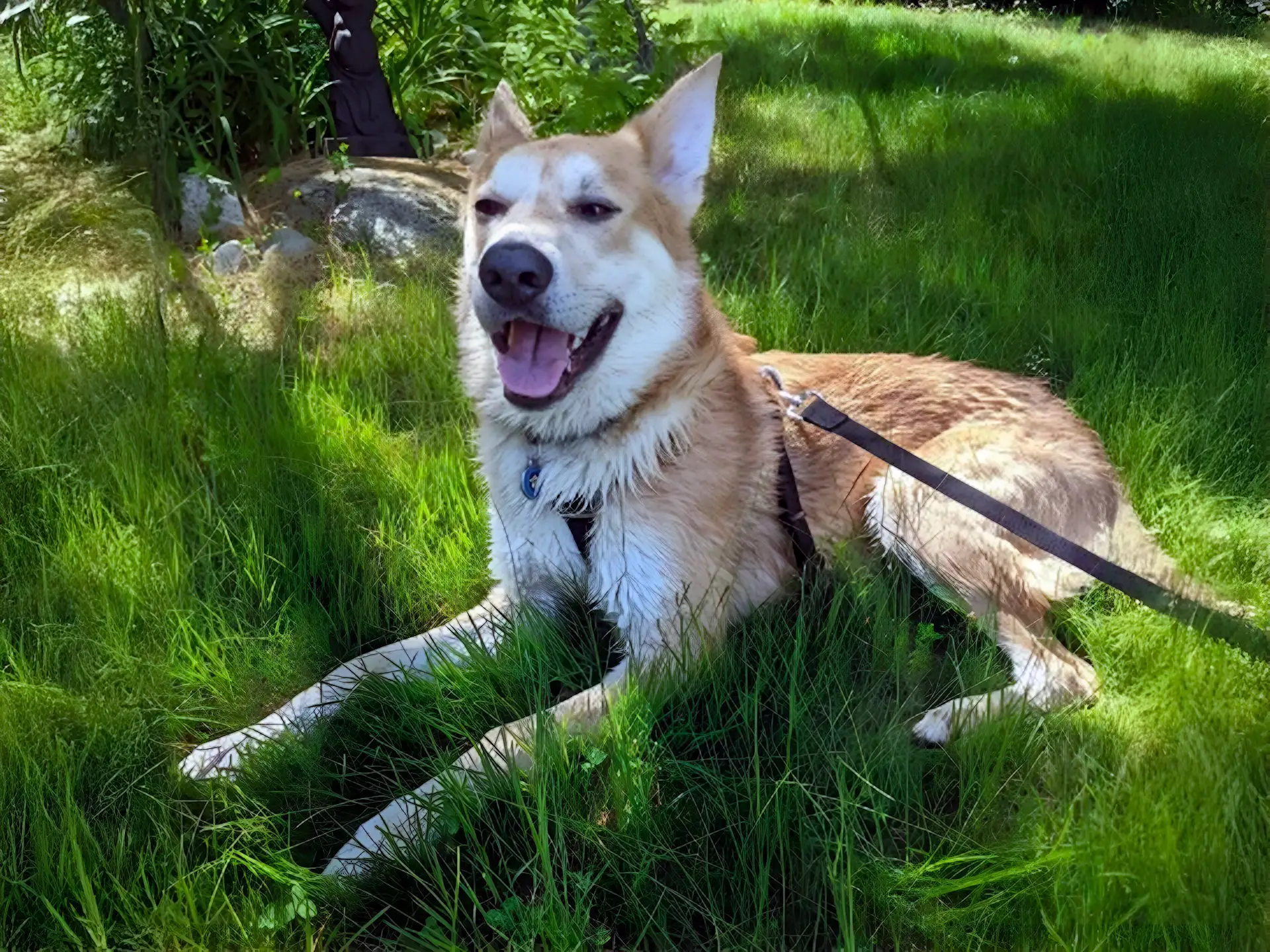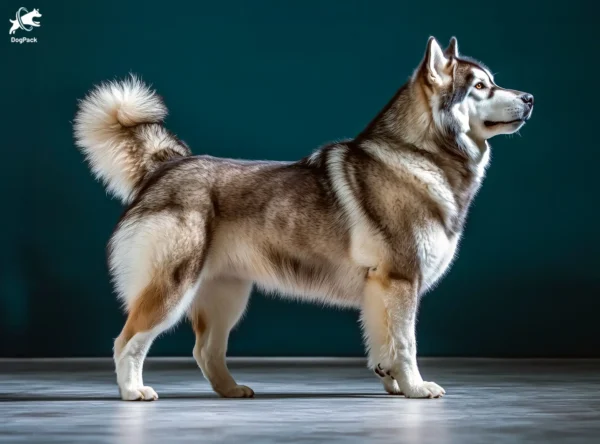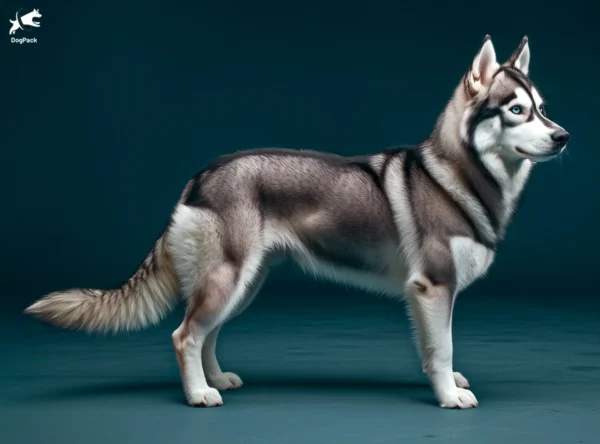Chinook Dog Breed Info & Overview
The Chinook, a rare sled dog from New Hampshire, is celebrated for its strength, endurance, and warm-hearted nature. Originally bred for work, this American breed combines power with a gentle, family-friendly disposition. Known for their friendly demeanor and striking appearance, Chinooks make exceptional companions, standing out as both devoted family dogs and hardworking partners.
Characteristics
Pictures
Breed History
Ever wondered how the Chinook came to be? It all started with Arthur Treadwell Walden in New Hampshire in the early 20th century. Walden was an adventurer, dog sledding enthusiast, and author, and he had a dream to create a sled dog breed that combined strength, loyalty, and intelligence. His breeding project began with a single dog named “Chinook,” who became the foundation of the breed we know today.
The Chinook was developed by crossing Mastiff-type dogs with Greenland Huskies and German Shepherds, creating a strong, hard-working sled dog that excelled in endurance rather than speed. These dogs were indispensable during polar expeditions, hauling sleds, supplies, and enduring harsh Arctic conditions. They quickly earned a reputation as loyal, tireless workers who also loved their human companions, thanks to their gentle and cooperative nature.
Despite their impressive qualities, the breed nearly went extinct in the 1980s, with fewer than 30 Chinooks alive. Dedicated breeders and enthusiasts undertook serious efforts to revive the breed, preserving its rare genetics and unique history. Today, the Chinook remains one of the rarest dog breeds, but its loyal fans celebrate its legacy as one of America’s unique contributions to the sled dog world.
Temperament, Personality
Chinooks are the gentle giants of the sledding world. Known for their affectionate, family-oriented personalities, these dogs bond deeply with their people. They’re naturally gentle, making them wonderful companions for families with children. You might catch them patiently tolerating a toddler’s curiosity or eagerly participating in family playtime, always calm and affectionate.
In social settings, Chinooks tend to be welcoming and friendly, displaying a cooperative spirit that reflects their sledding heritage. They typically get along well with other dogs, especially when socialized early, and can even be good with cats and other pets. Their easy-going nature makes them versatile companions, whether you’re at home or exploring the great outdoors.
Despite their sled dog roots, Chinooks aren’t known for intense guarding or territorial instincts, but they’re alert and will let you know if something’s amiss. These dogs thrive on companionship, and their happiest days are spent alongside their family, whether it’s relaxing on the couch or joining you on a hike. They can, however, develop separation anxiety if left alone for too long, so they do best in homes where they won’t be alone too often.
Physical Characteristics
The Chinook is a sight to behold—athletic, sturdy, and built for the outdoors. Typically medium to large, Chinooks stand between 21 and 27 inches tall and weigh anywhere from 50 to 90 pounds, making them both powerful and graceful. Their muscular build and deep chest hint at their sled dog heritage, designed to endure long hauls in harsh environments.
Their coats are thick and double-layered, perfectly suited to cold climates. Coat colors vary from honey-gold to reddish-brown, with some dogs having darker shading on the muzzle and ears. Their fur is water-resistant and provides excellent insulation, although it also means moderate shedding. Chinooks tend to have expressive, almond-shaped brown eyes, radiating a kind and intelligent gaze that wins over everyone they meet.
A Chinook’s ears can be varied: some are upright, others drop, and many have a charming semi-erect shape that adds to their unique look. Their tails are long and plumed, carried in a relaxed, downward curve. Every inch of the Chinook’s physique reflects strength, endurance, and a bit of wilderness flair, making them well-suited for an active lifestyle.
Health Issues
While generally healthy, Chinooks are predisposed to some genetic health issues. One of the most common is hip dysplasia, a condition that can affect mobility and cause discomfort over time. Regular screenings, especially for breeding dogs, help manage and reduce the prevalence of hip dysplasia in the breed.
Chinooks are also prone to eye conditions, such as cataracts, which can affect vision if left untreated. Regular veterinary eye check-ups are recommended, especially as the dog ages, to catch any problems early. Another potential concern for the breed is epilepsy, a condition that can lead to seizures. Responsible breeders screen for these issues to help ensure the healthiest puppies possible.
In general, the best way to support a Chinook’s health is through regular vet visits, balanced nutrition, and consistent exercise. Genetic testing for breeding pairs is crucial to help reduce health issues in future generations. With proper care, many Chinooks live long, healthy lives, happily trekking alongside their families for years.
Grooming Needs
Chinooks may look rugged, but their grooming needs are relatively straightforward. They have a thick double coat that sheds moderately year-round and heavily twice a year during seasonal changes. Weekly brushing with a deshedding tool or slicker brush can help keep shedding manageable and maintain their coat’s health.
During peak shedding seasons—usually in spring and fall—daily brushing can be beneficial to prevent matting and keep loose hair under control. Baths are only needed occasionally, as over-bathing can strip the natural oils from their coat, which helps to keep it weather-resistant. A monthly or bi-monthly bath is usually sufficient unless your Chinook gets into mud or dirt.
Besides coat care, don’t forget regular nail trims, dental hygiene, and ear cleaning. Chinooks are prone to ear infections if moisture or debris builds up, so a weekly check of the ears can help. Dental care is essential, too, as good oral hygiene supports overall health. Start grooming routines early to help your Chinook enjoy the process.
Exercise Requirements
If you’re thinking of adopting a Chinook, be ready for an active lifestyle! These dogs have moderate to high energy levels and require at least one to two hours of exercise daily. Walks, runs, hikes, or even bike rides are great ways to keep them fit and mentally stimulated.
Chinooks thrive in activities that mimic their sledding heritage, such as pulling carts or even participating in recreational dog sledding. They also excel in agility, obedience, and tracking exercises, making them versatile participants in various dog sports. Puzzle toys and interactive play sessions at home are excellent ways to keep their minds sharp and prevent boredom.
Without sufficient exercise, Chinooks may become restless or engage in undesirable behaviors, such as chewing or digging. They do best in active households where they’re given a job to do or a task to focus on. With the right balance of physical activity and mental engagement, a Chinook can be the perfect adventure companion.
Training Tips
Chinooks are intelligent and highly trainable, but they can sometimes have a stubborn streak. They respond well to positive reinforcement, so be sure to reward them with treats, praise, and play when they’re learning new skills. This breed is known for its eagerness to please, making training a rewarding experience.
Socialization from an early age is crucial. Exposing your Chinook to various environments, people, and animals helps develop a well-rounded, confident adult dog. While they’re not typically aggressive, early training can help minimize any territorial tendencies and teach them polite behavior around other pets.
Consistency is key with Chinooks. Keep training sessions short and engaging to hold their interest, as they can lose focus with repetitive drills. Patience and encouragement go a long way with this breed, and they’ll quickly learn to enjoy the challenge of learning new commands and tasks.
Nutrition, Diet
Feeding a Chinook requires careful attention to their unique nutritional needs. Because of their high activity level, they do well on a high-quality dog food rich in protein to support muscle maintenance and energy. A balanced diet with healthy fats, vitamins, and minerals ensures they stay in peak condition.
Typically, an adult Chinook requires around 3 to 4 cups of kibble per day, split into two meals. Their portions may vary depending on activity level, so it’s a good idea to consult your veterinarian for a personalized feeding plan. Avoid overfeeding, as obesity can lead to joint stress and other health issues.
Additionally, some owners supplement with omega-3 fatty acids to support joint health and a shiny coat. Always provide fresh water, especially after exercise, to keep them hydrated. For treats, stick to healthy options, avoiding foods high in fillers or artificial ingredients that don’t add nutritional value.
Adoption, Breeders
Due to their rarity, finding a Chinook might require patience and diligence. Begin your search with the Chinook Club of America, which can connect you with reputable breeders committed to preserving the breed’s health and unique characteristics. Always prioritize breeders who conduct thorough health screenings.
Adoption is also an option for those interested in a Chinook. Some organizations, such as the Chinook Owners Association or the Chinook Club of America, occasionally have rescue dogs available. Keep in mind that wait times may be longer due to the breed’s rarity. Websites like Adopt-a-Pet can sometimes have listings for Chinooks.
When purchasing from a breeder, be sure to meet the puppy’s parents and ask about health clearances. Reputable breeders are transparent and passionate about their dogs. Avoid puppy mills and sellers who can’t provide information on health and breeding practices.
Family Pet?
Chinooks are gentle, family-oriented dogs who fit well into homes with children and other pets. Known for their patience, they’re often comfortable around kids, even tolerating curious toddlers with calm tolerance. Their affectionate nature makes them ideal companions for family life.
These dogs tend to be friendly with other pets, especially when introduced early. Their sledding background promotes cooperation, so they generally adapt well to multi-pet households. However, supervision is recommended during play to ensure everyone’s safety due to the Chinook’s size.
Because they’re highly social, Chinooks are happiest when they’re part of daily family activities. Families who can provide plenty of attention and exercise will find the Chinook a loving, loyal addition to the household. However, they don’t do well when left alone for long hours.
Right For You?
If you’re an active individual or family who loves the outdoors, the Chinook could be a great fit. These dogs thrive in environments where they can participate in physical activities like hiking or running. They’re best suited for owners who can commit to their daily exercise needs.
However, Chinooks require more than just physical activity; they crave companionship. If your lifestyle allows you to spend quality time with your pet, the Chinook’s loyalty and friendliness will be rewarding. They’re ideal for owners who appreciate a dog that combines intelligence with a gentle nature.
Consider your home space as well. Although they can adapt to various environments, Chinooks do best in homes with access to outdoor areas. With the right match, these dogs become devoted, joyful companions, enhancing any household they join.
Conclusion
In summary, the Chinook is a unique breed known for its strength, loyalty, and loving nature. With their gentle disposition, they make wonderful family pets for those who can meet their exercise and social needs. Though rare, they’re well worth the search, offering companionship that’s both devoted and lively.
For the right person or family, the Chinook brings boundless joy and adventure. If you’re ready for an affectionate, active partner who thrives on companionship, the Chinook might just be the perfect match for you.
FAQs
-
What makes Chinook dogs good with other pets?
Chinooks have a gentle and cooperative temperament, making them naturally compatible with other pets. Early socialization further encourages positive interactions, allowing them to adapt well to living with other dogs and even cats.
-
Do Chinook dogs bark frequently?
Chinooks are known for being relatively quiet. While they will alert their owners to unfamiliar sounds or guests, they’re not prone to excessive barking, which makes them ideal for families seeking a calm breed.
-
How rare are Chinook dogs today?
Chinooks are among the rarest dog breeds globally, with limited registered births each year. This rarity often leads to waiting lists, and prospective owners should research thoroughly to connect with reputable breeders.
-
What activities do Chinooks particularly enjoy?
Chinooks thrive in activities that engage both mind and body, like sledding, carting, and hiking. They excel in dog sports like agility, where they can bond closely with their humans, which fulfills their loyal and adventurous nature.
-
Are Chinook dogs suited to apartment life?
Due to their size and high energy, Chinooks are better suited to homes with ample space. They require regular exercise, ideally with access to outdoor areas, to keep them physically and mentally satisfied.
Breed Ratings
Chinooks are highly intelligent and quick learners, making training a rewarding experience for both dog and owner.
They have a playful side and enjoy games and activities, especially those that involve their family members.
With high energy levels, Chinooks need plenty of daily exercise to keep them physically and mentally satisfied.
Moderate shedding year-round with seasonal increases; regular grooming helps manage loose hair.
Chinooks have a low to moderate prey drive, making them generally safe around smaller animals when properly socialized.
Their thick double coat requires moderate grooming; weekly brushing and occasional baths are sufficient.
Eager to please and intelligent, Chinooks respond well to positive reinforcement and consistent training methods.
They prefer companionship and may experience separation anxiety if left alone for extended periods.
Typically quiet, Chinooks are not known for excessive barking or howling.
Minimal drooling; Chinooks are relatively tidy when it comes to slobber.
Generally friendly towards other dogs, especially when properly socialized from a young age.
Overall healthy but can be prone to certain genetic conditions; regular vet care is important.














